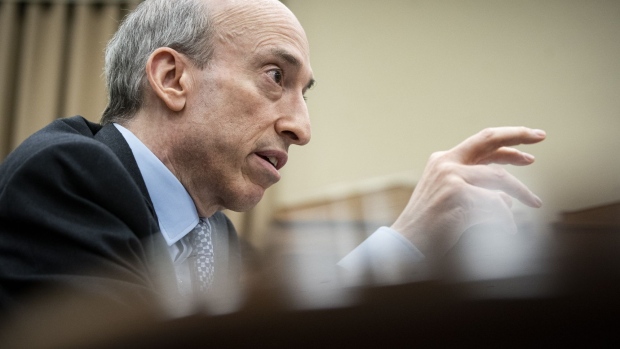Jul 13, 2022
Corporate Backlash Over SEC Climate Plan Takes Shape
, Bloomberg News

(Bloomberg) --
By November, around the time US midterm elections are held, investors will likely learn the fate of the Securities and Exchange Commission’s plan for more comprehensive corporate climate disclosures.
The SEC announced plans in March to require companies to spell out the risks that the climate crisis poses to their operations in annual reports and other documents. It calls for auditors or other experts to review the data and also wants more companies to disclose the emissions produced by businesses in their supply chain, or their so-called Scope 3 emissions.
While the proposal has support from environmental defenders, Democrats and some of the largest public pension funds, it has been roundly rejected by numerous business lobbying groups and Republicans who contend such rulemaking falls outside the SEC’s purview.
Over the past four months, the agency has received dozens of letters from individuals and groups making their own recommendations on how it should proceed. It’s possible the SEC will water down specifics of the plan before holding a second vote to finalize the regulation. But the idea that the SEC will retract its plan is arguably close to zero, even as the expected political firestorm from right-wing groups grows.
Attorneys general from 24 Republican-controlled states stretching from Alaska to West Virginia wrote to the SEC last month, calling the agency’s climate-related disclosure rule “an ill-advised misadventure into environmental regulation.”
They argue Congress created the SEC to protect investors and financial markets, and that (despite the accelerating damage wrought by global warming) this proposal does neither. Instead, it pushes “naked policy preferences far afield.”
“It’s up to lawmakers to decide major policy questions like these, not unelected agency administrators,” the Republican lawyers wrote in their June 15 letter.
Ultimately, the states said they object to the rule based on three claims: First, that the SEC lacks statutory authority to issue it; second, it violates the First Amendment; and third, the rule doesn’t reflect reasoned decision-making and so would fail arbitrary and-capricious review by the courts.
Investors, who the rule is meant to protect, don’t see it the same way. One of the biggest, the California State Teachers’ Retirement System, says the SEC should go even further in its rule and make Scope 3 emission disclosures mandatory for all publicly traded companies.
Read more: S&P 500 Companies Issue Reports on ‘Indirect Emissions’
Rob Du Boff, a senior ESG analyst at Bloomberg Intelligence, notes that while there is some genuine economic anxiety over the carbon transition, the biggest motivator is politics, pure and simple.
“Elected officials, particularly in energy-producing states, are leveraging budgets and regulation to push back,” he said.
They have threatened to cut ties with banks and asset managers viewed as allocating capital away from industries like fossil fuels and guns, while railing against regulations designed to improve transparency around environmental, social and governance investing, Du Boff said.
“We think the overall ESG pushback is unfounded and could ultimately blind pension funds to long-term risks like climate change and inequality,” he said.
And the facts are the facts. The US is the largest historical emitter of greenhouse gases, and the world has warmed by about 1.1 degrees Celsius since 1850, making the planet hotter than it’s been in at least 125,000 years.
Du Boff said the SEC’s proposal is aimed at helping investors quantify and standardize financial risks posed by climate change and the carbon transition. In effect, issuers must report how they identify and manage climate risks, in addition to certain audited greenhouse-gas emissions data, he said.
Legal challenges are inevitable, given the sizable cost of implementation (estimated at $18.4 billion in the first six years), and the challengers may ultimately succeed in quashing the rule, given the Republican-appointed supermajority that controls the Supreme Court.
Read more: Supreme Court Crimps Biden’s Climate Agenda
“The asset-management industry has largely come to a consensus that climate risk is financial risk, so it’s disappointing that politicians feel the need to meddle to gain points with their electorate,” Du Boff said. “The irony is they’re using the old ‘stay-in-your-lane’ argument, while not heeding their own advice.”
Bloomberg Green publishes Good Business every week, providing unique insights on ESG and climate-conscious investing.
©2022 Bloomberg L.P.







